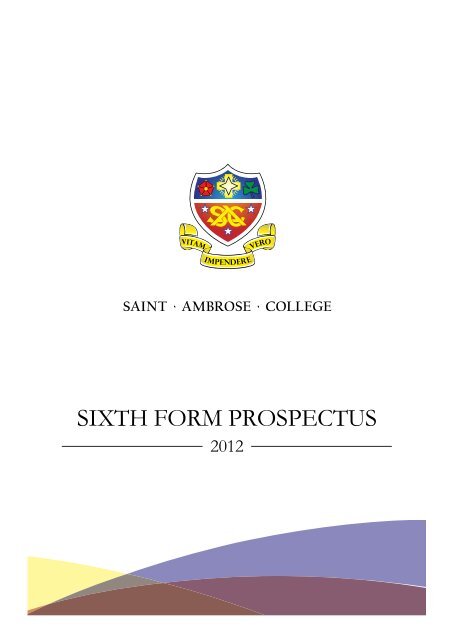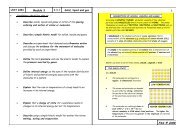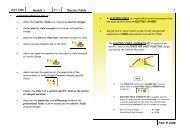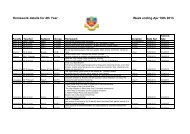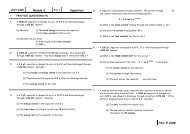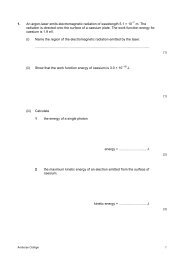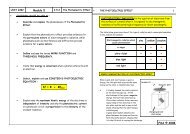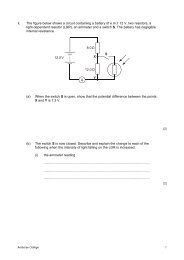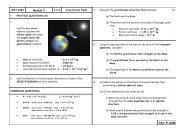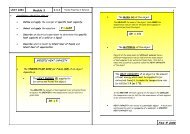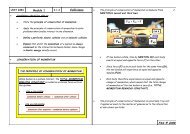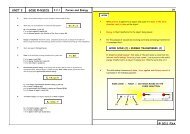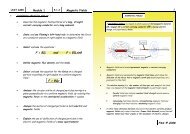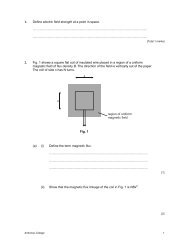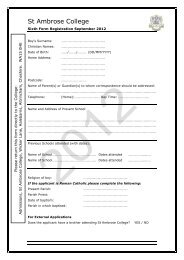SIXTH FORM PROSPECTUS - St Ambrose College
SIXTH FORM PROSPECTUS - St Ambrose College
SIXTH FORM PROSPECTUS - St Ambrose College
Create successful ePaper yourself
Turn your PDF publications into a flip-book with our unique Google optimized e-Paper software.
THE HOUSE STRUCTUREThe pastoral system is designed around four Houses which each have approximately 245 boys. All rewards andcompetitive activity are initiated through the House structure. Sanctions, monitoring and target setting are alsoactivated through the four Houses.• Aquinas (Blue): House Leader - Mr Rush• Augustine (Green): House Leader - Mr Aspinwall• Ignatius (Red): House Leader - Mrs Davies• Newman (Yellow): House Leader - Mr KrauseAny Sixth Former that has already attended the <strong>College</strong> will remain in the same House upon entering the SixthForm. Successful external applicants will be placed into a House upon entering the Sixth Form.There are eight Tutor Groups in the Sixth Form which meet at the beginning of each day from 9:00 - 9:30. Thesehave been structured so that Lower Sixth and Upper Sixth boys are equally mixed across the eight groups. Thisstrengthens a sense of community and increases collaboration with regard to applying to and preparing foruniversity. Priority has been given to the Sixth Form so that all the ICT suites within the <strong>College</strong> are used as Tutorbases.Each Tutor Group has an equal number of boys representing each House. House Assemblies take place onMonday (Aquinas), Tuesday (Augustine), Thursday (Ignatius) and Friday (Newman) during House Period (9:00 –9:30) so a different quarter of the Tutor Group attends the assembly on each of these days. All Year groups withinthe <strong>College</strong> are present at each House Assembly.Wednesday House Period provides a unique opportunity for all Sixth Formers to demonstrate leadership qualitiesthrough their integration into the House Groups in the rest of the <strong>College</strong>. A rota is published and Sixth Formersactually take the House Period with their younger contemporaries. They support the Catholic ethos by starting thesession with a Gospel reading before explaining its meaning. They are then required to deliver a 5 – 10 minutepresentation on any topic of their choice and teach the younger students. In an increasingly competitive globalemployment market, this opportunity to refine their presentational skills is invaluable. A key benefit of this systemis that it also allows the Sixth Form Tutors to plan individual meetings with their tutees during House Period eachWednesday. An individual’s progress and performance is discussed and appropriate targets are established andthen monitored by the Tutor.Sixth Formers are supported by their Tutor, House Leader and Assistant Head Master, Mr McGrath, who hasoverall responsibility for the Sixth Form.Sixth Form Leadership OpportunitiesAt the end of the Lower Sixth, teachers are invited to indicate their preferences for Head Boy, Deputy Head Boyand Prefects. The successful nominations for the most important positions are interviewed by the Head Masterand the two most senior posts, Head Boy and Deputy Head Boy are then appointed. From staff preferences, sixPrefects for each House are announced.House Captains and House Vice-Captains are elected by their peers. Lower Sixth boys who wish to be consideredare invited to write a letter of application to the Head Master. Individuals are then required to deliver aspeech in their respective House Assemblies to the rest of their House. The whole House listen to each speechbefore voting for their House Captain and House Vice-Captain for the next twelve months.The Sixth Form Leaders meet regularly with the Head Master to discuss both Sixth Form issues and theprogramme of competitive activities for the rest of the <strong>College</strong> to participate in which the House Captains planand lead. They also form a very important part of the School Council, listening to the views of their younger peersbefore reporting their findings to members of the Senior Leadership Team.
ENRICHMENTThe <strong>College</strong> offers a curriculum enrichment programme to all students in the SixthForm. The aim of the programme is to offer breadth and variety to post-16 education.Why is the Enrichment Programme important?Employers and universities are increasingly demanding evidence of a repertoire of skills from you that complementexcellent exam results. If you choose to apply to university through UCAS, you will be asked to writeapproximately 600 words for your Personal <strong>St</strong>atement. This should differentiate you in a positive light from otherapplicants.We currently offer an enrichment programme each Wednesday afternoon where the following options are available:• Critical Thinking• Duke of Edinburgh Award scheme• Sporting Activities for boys selected for specific teams• Working with teachers in the class room• Work Experience<strong>St</strong>udents taking part in a Critical Thinking sessionDuke of Edinburgh Award SchemeThe Duke of Edinburgh’s Award is a voluntary programme of practical,cultural and adventurous activities, designed to support the personal andsocial development of young people aged 14-25. It offers you achallenge and encourages you to undertake exciting, constructive,challenging and enjoyable activities in your free time.
ENRICHMENTSpiritual ActivitiesEach year the <strong>College</strong> offers Sixth Form students the opportunity to participate in a religious retreat at Kintburyand to join the Shrewsbury Diocese pilgrimage to Lourdes. The exploration of the spiritual dimension will allowstudents to explore beliefs with like-minded individuals and, in the process, make new friends.Sixth Form students make a significant contribution to community activities e.g. Chaplaincy work, SVP, MillenniumVolunteers, Cornerstone, Barnardos and helping the local elderly.MentoringSixth Formers support younger Ambrosians through mentoring. Sixth Formers may be linked with a particularHouse Group and work closely with a House Tutor, or they may assist the teaching staff by using their advancedknowledge and skills to work with individual pupils in lessons or at lunchtimes.<strong>St</strong>udents and staff teaching Sierra Leone children
ART & DESIGNThe Art Department will prepare students for the new AQA syllabus.Scheme of Assessment: AS UnitsUnit 1: Coursework Portfolio (50% of AS)Candidates are required to work sequentially from a number of given starting points or themes throughout the courseand develop projects which build on those at GCSE.A portfolio of work will then be selected and must include a work journal or sketch book, evidence of research, analysis,exploration of media, idea development, resolved piece(s) and visual and/or written evaluation.Unit 2: Externally Set Assignment (50% of AS)In the externally set examination candidates will select one of five starting points, develop work during the preparatoryperiod and finally sit a timed examination session (5 hours) when a final piece must be produced. Again this exam buildson the final GCSE examination.Scheme of Assessment: A2 UnitsUnit 4: Personal Investigation (50% of A level)The unit requires candidates to produce a practical unit with written elements in which candidates are expected todevelop a personal investigation based on an idea, issue, concept or theme leading to a finished piece or pieces. Thepractical elements should be linked with some aspect of contemporary or past practice of artists, designers orcraftspeople. Written material of a critical, analytical nature can be included in a variety of forms, such as a personalstudy, a journal, a log, reports on gallery visits or an evaluation and reflection on candidates’ work and that of others.Written material should be -5000 words.Unit 7: Exteranlly Set Assignment (50% of A level)In the externally set examination candidates will select one of eight starting points, develop work during the preparatoryperiod and finally sit a timed examination (15 hours) when a final piece must be produced. Again this exam builds on thefinal AS examination.
SCIENCESaint <strong>Ambrose</strong> <strong>College</strong> provides Sixth Form students with the opportunity to studyChemistry, Biology and Physics at AS and A2 level. Many students each year opt tostudy more than one Science subject, although this is not obligatory.What resources will I be working with?The Faculty recognizes that all Sciences are practically based subjects, and as such strives to ensure all studentsare exposed to and participate in high quality practical investigations and experiments. These may then go on toform part of external assessment.All students are provided with appropriate, relevant textbooks and other paper resources as required. A smalllibrary of Science reference books is available within the Faculty alongside those held in the school library.Who will teach me?The Science Faculty is well staffed with experienced and motivated staff. They provide excellent teaching andguidance to Sixth Form students, indeed our number includes an author of a nationally renowned A-leveltextbook. We are united by our desire to deliver high quality Science education for all.What extra opportunities will I have?Sixth Form students are regularly provided with the chance to attend a variety of lectures organised by variousscientific organisations outside the <strong>College</strong> in addition to the many trips organised by our own science staff.These opportunities seek to enhance the experience of our Sixth Form scientists, to allow them a taste of scientificcareers and to strengthen their bids in the competitive field of University places.
RELIGIOUS STUDIESScheme of Assessment: A2 UnitsUnit 3: DevelopmentsThis unit allows students to develop their knowledge of philosophy of religion and religious ethics fromAS. This unit will challenge the student to probe further into philosophic and ethical arguments.Furthermore the unit will, among other issues, consider, in more depth, aposteriori/apriori arguments forGod’s existence and seek to develop within the student a deeper exploration and understanding ofethical theory.Unit 4: ImplicationsThis final summative unit blends and brings together the component parts of the two year course.<strong>St</strong>udents will sit a final paper that will challenge them to compose an essay which synthesis the mainphilosophic and ethical issues and will be based around one of the following areas:• Religious Experience• Religious Language• A critique of religious or philosophical beliefSkills Developed• Knowledge and Understanding - Key concepts e.g. doctrines, teachings, principles, ideas & theories.• Key Skills - ICT, Communication, Problem Solving, Lateral Thinking and more.• Analysis and Evaluation - interpret, evaluate and analyse religious and philosophical ideas and issues.• Spiritual, Moral and Cultural Development - learning about our faith and learning about their faiths, beliefsand culture.RelevancyMany employers and universities will be impressed by this choice of subject since it will present the profile of astudent who possesses a logical and analytical approach to situations, who can apply lateral thinking to achallenge, who offers his own informed opinion while respecting the view of others, and who has developed anethical and moral maturity beyond the reach of many of his peers.
SCIENCE: BIOLOGYThe AQA Syllabus is intended to be a natural extension of GCSE. The topics studied inYear 12 provide a bridge to the more demanding aspects of A2.Why <strong>St</strong>udy Biology?The subject currently receives 5 periods per week and is taught, almost exclusively, in the Biology Laboratories.Additional tuition is provided each year for Oxbridge candidates. The study of Biology at this level offers theintellectual rigour of the Sciences combined with literacy and communication skills of a fairly high order.Scheme of Assessment: AS UnitsUnit 1: Biology & DiseaseTopic list:• How digestive and gas exchange systems may be affected by communicable andnon-communicable diseases• How a knowledge of basic biology allows us to understand the symptoms of disease andinterpret data relating to risk factors.Unit 2: The Variety of Living OrganismsTopic list:• The influence of genetic and environmental factors on intraspecific variation• How the variety of life is reflected in similarities and differences in its biochemical basis andcellular organisation• How size and metabolic rate affect an organism's requirements and give rise to adaptations.Unit 3: Practical and Investigative SkillsTopic list:• Practical work in the contexts of Units 1 and 2• Assessment of implementing skills on practical work as a whole• Assessment by AQA-set tasks.
SCIENCE: BIOLOGYScheme of Assessment: A2 UnitsUnit 4: Populations & EnvironmentTopic list:• How living organisms form ecosystems through which energy is transferred and chemicalelements cycled• How human activity affects ecological balance in a variety of ways• How genetic variation and isolation may lead to the formation of new species.Unit 5: Control in Cells and in OrganismsTopic list:• <strong>St</strong>imulus and responses - the biology of the nervous and endocrine systems• Homeostasis and the maintenance of a constant internal environment• Genes and genetic expression.Unit 6: Practical and Investigative SkillsTopic list:• Practical work in the contexts of Units 4 and 5• Assessment of implementing skills on practical work as a whole• Assessment by AQA-set tasks.Career OpportunitiesThe range of career options open to Biologists is extensive, and ex-students of the <strong>College</strong> are currently workingin fields as diverse as Genetic Engineering, the Royal Navy and Law.
SCIENCE: CHEMISTRYWhy <strong>St</strong>udy Chemistry?The study of Chemistry in the Sixth Form provides the opportunity to further develop a knowledge and understandingof the principles which were studied at GCSE. The course encourages the development of an awarenessof the huge impact that science and technology have on our society.Chemistry is one of the most popular A level choices and currently 70 boys are taking A level in the Upper andLower Sixth. Chemistry is most often studied alongside two subjects chosen from Mathematics, Physics andBiology. Boys also regularly take Chemistry alongside other subjects from the arts and humanities.Scheme of Assessment: AS UnitsUnit 1: Foundation ChemistryTopic list:• Particles, composition of the nucleus, isotopes and use of mass spectrometer• Calculating the amount of substance• Ionic, covalent and metallic bonding and intermolecular forces• The construction of the periodic table• Organic chemistry• Alkanes from crude oil.Unit 2: Chemistry in ActionTopic list:• Collision theory and effect• Definitions of oxidation and reduction• Redox properties of halogens and halide ions• The extraction of Metals• Haloalkanes and alkenes.Unit 3: Investigative and Practical Skills - Internal AssessmentTopic list:• Making observations and measurements• Analysing and evaluating results.
SCIENCE: PHYSICSWhy <strong>St</strong>udy Physics?<strong>St</strong>udents follow the OCR Advanced Level Syllabus A that leads to qualifications at AS level and A level.The aims of these Advanced Subsidiary and A Level specifications are to:(a) provide through well designed studies of theoretical and practical physics, a worthwhile educationalexperience for all students, whether or not they go on to study physics at a higher level.(b) encourage candidates to develop essential knowledge and understanding in the applications of physics, andthe skills needed for the use of this in new and changing situations.The course provides an opportunity for candidates to appreciate the following aspects of the natural world:• the endeavour of physics in describing its structure and functioning;• the scale and impact of natural processes and phenomena;• the moral implications of some of the applications of science and technology.The course is delivered through formal teaching, demonstration, student investigation, research and practicallaboratory work.A grade B or higher in GCSE Mathematics is also required.Career OpportunitiesA qualification in Physics can lead to careers within Engineering, Robotics, Computer Science, Nanotechnologyand Materials Science although the logical and analytical skills developed within the course are also respectedwhen applying for non-science university courses.
BUSINESS STUDIESWhy <strong>St</strong>udy Business <strong>St</strong>udies?Business <strong>St</strong>udies is now one of the most popular A level subjects and the department has a record of fantasticresults. The subject enables students to gain an appreciation of the main aspects of the business world and theway businesses make their decisions. <strong>St</strong>udents will gain an understanding of the relationship between businesstheory and practice and Business <strong>St</strong>udies will provide the ideal option for candidates who wish to take eitherScience or Humanities based subjects. More specifically, Business <strong>St</strong>udies provides an ideal background forthose considering self-employment or thinking of pursuing a career in Finance or Marketing.Business <strong>St</strong>udies at Advanced level is designed to teach some of the basic factual information surroundingbusinesses and their operations and to enable discussion of them and their place in today's society.The course comprises a number of individual components, which cover subjects such as economic variables,accounts, management, marketing, human resources, operations, business law and business organisation.Scheme of AssessmentAS Modules• Planning & Financing a Business• Managing a BusinessA2 Modules• <strong>St</strong>rategies for Success• The Business Environment & Managing Change (Synoptic)
COMPUTINGComputing CourseA level computing is a very academically challenging subject. It requires a strong ability both in mathematics and ICT.The AS course is divided into two modules; one practical and one theory. Both of these modules will be externallyassessed, through an on-screen examination and a written paper.Scheme of Assessment: AS UnitsModule 1Topics include:• Problem Solving,• Programming,• Data Representation• Practical ExerciseModule 2 - Computer Components, the <strong>St</strong>ored Program Concept and the InternetTopics include:• Fundamentals of computer systems• Hardware architecture• <strong>St</strong>ructure of the internet• Social & economic consequences of computing
COMPUTINGComputing CourseScheme of Assessment: A2 UnitsModule 3 - Problem Solving, Programming, Operating Systems, Databases and NetworkingTopics include:• Theoretical computing• Programming concepts• Operating systems• Communications & networkModule 4 - The Computing Practical ProjectYou will use the systems life cycle to program an application to respond to a particular problem. You willdocument your solution as well as creating a prototype of the application. This project is completed inVisual Basic although other programming languages can be used.
DESIGN & TECHNOLOGYProduct Design – Graphic ProductsBoys will study two units in the Lower Sixth and two in the Upper Sixth.Scheme of Assessment: AS UnitsUnit 1: Portfolio of Creative Skills (60% of AS)1. Product Investigation (PI)2. Product Design (PD)3. Product Manufacture (PM)In this unit you will have the opportunity to develop your creative, technical and practical skills through a series of designand manufacturing activities.Unit 2: Design & Technology in PracticeIn this unit you will develop your knowledge and understanding of a wide range of materials and processes used in thefield of Design and Technology: Product Design.You will explore industrial and commercial practices, the importance of quality checks and health and safety issues thathave to be considered at all times.The unit is assessed by a 90 minute examination set and marked by Edexcel which takes place in the summer ofeach year. The examination will consist of compulsory short-answer and extended-writing type questions.
DESIGN & TECHNOLOGYProduct Design – Graphic ProductsScheme of Assessment: A2 UnitsUnit 3: Designing for the Future• Develop a knowledge and understanding of a range of modern design and manufacturing practices andcontemporary design issues.• Develop a good working knowledge of the use of Information Communication Technology (I.C.T) and systems andthe control technology in the design and manufacture of products.• Learn about the important contribution of designers’ form the past, which may provide inspiration for future design.• Develop an awareness of the impact of design and technological activities upon the environment and howsustainable product design is a key feature of modern design practices.Unit 4: Commercial DesignFrom the perspective of a professional designer you will design and make a commercially viable product of your choicethat complies with the requirements of a Graphic Products project.. A key feature of this unit is to consider issues relatedto sustainability and the impact your product may have on the environment.Career opportunitiesDesign Technology Product Design: Graphics Products would be an ideal choice for any student considering acareer as an architect, engineer, planner, product designer, teacher or indeed any of the creative areas of study.
ENGLISH LANGUAGE & LITERATUREWhy <strong>St</strong>udy English Language & Literature?There are many advantages to this particular combined course that is offered by AQA. The range oftexts that are available to study has been very well received in recent years. In the Lower Sixth, TheKite Runner and A <strong>St</strong>reet Car Named Desire have been read and discussed with great enthusiasm. Acreative and literary response under timed conditions are part of the AS examinations. The second unitat AS explores the analysis of speech and the application of these skills to All My Sons.The Upper Sixth/A2 coursework has been very popular at Saint <strong>Ambrose</strong> and outstanding grades inthis area have been secured. Shakespeare’s Hamlet and Sylvia Plath’s Ariel are extremely thoughtprovoking texts and the coursework responses have exhibited an excellent understanding of thelinguistic and literary techniques used. The final examination at A2 requires candidates to demonstratetheir advanced ability to analyse unseen spoken texts. The second part of the exam expects studentsto produce a precise written response which is effectively written for a specific purpose and audience.<strong>St</strong>udents have to demonstrate why they have made deliberate choices as a writer in order to createspecific effects upon the reader or listener.AQA Specification A The specification complements and further extends the skills that have beenacquired during the study of GCSE English Language and Literature.Scheme of Assessment: AS UnitsUnit 1: Integrated Analysis and Text ProductionAssessment (AS 50% / 25% Total A Level) – Exam (1 hour 30 minutes)Unit 1 looks at language production and students will study two texts, looking at issues such as theme,attitude, language and idiom. Texts in this section include The Kite Runner (Khalid Hosseini), Things FallApart (Chinua Achebe), A <strong>St</strong>reetcar Named Desire (Tennessee Williams) and Wuthering Heights(Charlotte Bronte)Unit 2: Analysing Speech and Its RepresentationAssessment (AS 50% /25% Total) – Exam (1 hour 30 minutes)In Unit 2 students will look at speech in a literary or non-literary context, and they will study one text,analysing speech, style and linguistic issues. Texts in this section include Enduring Love (Ian McEwan)and Waiting for Godot (Samuel Beckett)
ENGLISH LANGUAGE & LITERATUREScheme of Assessment: A2 UnitsUnit 3: Comparative Analysis and Text AdaptationAssessment (30% Total) – Exam (2 hours 30 minutes)<strong>St</strong>udents will use a variety of approaches to analyse and compare unseen texts, and they will developproduction skills through non-fiction writing.Unit 4: Comparative Analysis through Independent <strong>St</strong>udyAssessment (20% Total) – Coursework (1500-2,500 words)<strong>St</strong>udents will choose a comparative question to explore the relationship between two texts chosen from aprescribed list, including Ariel (Plath), The Whitsun Weddings (Larkin), The Wife of Bath’s Prologue andTale (Chaucer), Songs of Innocence & Experience (Blake) and Hamlet (Shakespeare)Career OpportunitiesGCE English Language & Literature is an invaluable qualification for life. It is widely recognised by both highereducation institutions and employers. The linguistic nature of the course develops skills that will be essential forlife long learners.Further information can be found at:www.aqa.org.ukDevelopments/ New GCEs/ English Language & Literature A (2720)
MODERN FOREIGN LANGUAGESThe study of a foreign language is both profitable and enjoyable for a number of reasons. Thereis, in this country, a desperate shortage of linguists and people to train them.Not only do we need specialist interpreters and translators but increasingly our business and industrial personnele.g. executives, sales staff, those working in tourism, and the travel industry need a foreign language. For thoseseeking employment in Europe's expanding job market e.g. scientists, engineers, accountants, another languageis most useful.Of course, to train all these people we need more language teachers.Aware of this situation, our Universities offer, in addition to their more traditional language course, more and morecourses which combine study of a foreign language not only with other languages but with many otherdisciplines, e.g. Law, English Literature; Management; Economics; Mathematics; Business <strong>St</strong>udies; History;Philosophy; Politics; Chemistry; Psychology; Physics; Biology; Linguistics; the list is not exhaustive.Quite apart from the advantage a candidate seeking employment gains from being able to offer a foreignlanguage, there is the pleasure, which comes from contact with, and understanding of, another people and theirculture, allowing linguists to enjoy their leisure activities more fully.In addition, the study of another language offers insights into the nature of language and language learning, withbenefits for one's understanding and grasp of English, while providing a basis for further language study.At Saint <strong>Ambrose</strong> <strong>College</strong> we offer French & Spanish at AS and A2.
MFL: FRENCHThe WJEC syllabus is intended to make a natural transition from GCSE to AS level withthe emphasis being on the four linguistic skills which were developed at Key <strong>St</strong>age 4,together with the acquisition of knowledge of the contemporary culture and society ofFrance and the French speaking world.A popular feature of the course is for students to opt for exciting and innovative topics such as the study of a film,a book or a region. There will be opportunities to participate in University visits, exhibitions, theatre trips andworkshops.It is hoped that students in the Upper Sixth will take part in a foreign study visit in France/Spain to increase theirknowledge and develop their linguistic skills. In the past such trips have proved to be enjoyable, rewarding andexciting experiences for the students.The prescribed areas of study are as follows:Scheme of Assessment: AS UnitsAS Units: Topics A & BTopic A: Leisure & LifestylesThis includes travel and tourism, sport, hobbies, entertainment, customs, traditions, healthy living, health and nutrition,diet and exercise; unhealthy living - drugs, aids, smoking, alcohol, etc.Topic B: The Individual & SocietyThis includes relationships and responsibilities, gender issues, youth culture (values, peer groups, fashions and trendsetc.), education, vocational training and future careers.Scheme of Assessment: A2 UnitsA2 Units: Topics C & DTopic C: Environmental IssuesThis includes technology pollution, global warming, transport, energy, nuclear energy, renewable energies, conservation,recycling, sustainability.Topic D: Social & Political IssuesThis includes the role of the media, racism, immigration social exclusion and integration, terrorism, world of work(employment, commerce, globalization, etc.),The syllabus emphasises the use of the target language, reflecting the increasing use of the target language inthe teaching and learning of Modern Foreign Languages.AS Units• Unit 1: Oral40% of AS or 20% of A2• Unit 2: Listening, Reading and Writing60% of AS or 30% of A2A2 Units• Unit 3: Oral20% of A2• Unit 4: Listening, Reading and Writing30% of A2
MFL: SPANISHScheme of Assessment: AS UnitsAS Units: Topics A & B• Media (Television, Advertising, Communication Technology),• Popular Culture (Cinema, Music, Fashion/Trends),• Healthy Living (Sport/Exercise, Health and Well being, Holidays)• Family and Relationships (Relations in the Family, Friendships, Marriage/Partnerships)Unit 1 –Listening, Reading and Writing70% of AS, 35% of A Level2 hour written examination110 marksAvailable January and JuneUnit 2 – Speaking Test30% of AS, 15% of A Level35 minutes speaking test (including 20 minutespreparation)50 marksAvailable JanuaryA2 ExaminationsScheme of Assessment: A2 UnitsA2 Units: Topics C & D• Environment (Pollution, Energy, Protecting the planet)• The Multicultural Society (Immigration, Integration, Racism)• Contemporary social issues (Wealth and Poverty, Law and Order, Impact of scientific and Technological Progress)• Cultural topics – an author, poet, director, architect or region.Unit 3 – Listening, Reading and Writing35% of A Level2 hours 30 minutes written examination110 marksAvailable June onlyUnit 4 – Speaking Test15% of A Level35 minutes speaking test (including 20 minutespreparation)50 marksAvailable June only
GEOGRAPHYWhy <strong>St</strong>udy Geography?Geography is a subject that can be studied alongside a number of sciences. The study of plant succession andecosystems overlaps into Biology whilst climate change and the weather involve Physics. Weathering of rocks haslinks with Chemistry and Geographers make use of numerous statistical tests that link to Mathematics.Geography is also a subject that can be studied alongside other art subjects.For example essay writing involves English skills whilst History develops the skill of looking at issues from differentviewpoints. Geography and languages are a great advantage if you want to work abroad or in the tourism industry.Geography is a relevant subject as it looks at things that have happened in the past, are happening today and whatmight happen tomorrow. Geography is all around you – the weather, agriculture, settlements, pollution, poverty,national parks and climate change.If you are not sure of what you want to do in the future, Geography is a way of keeping your options open. It willimprove your IT skills – word processing, drawing graphs and statistics, power point presentations and researchingthe internet. It is a subject that develops transferable skills that make you suitable for a wide variety of jobs andmakes you more employable. Choose Geography.Scheme of Assessment: AS UnitsUnit 1: Changing Physical EnvironmentsTopic list:• Investigating Climate Change – This looks at the causes of climate change, the issues resultingfrom this change and the strategies used to tackle this change at international, national andindividual levels.• Investigating Tectonic and Hydrological change – This looks at the processes associated with platetectonics, the hazards associated with tectonic events and how they can be managed. It also looksat the hydrological processes associated with drainage basins, the causes and consequences offlooding and how these hazards are managed.Unit 2: Changing Human EnvironmentsTopic list:• Investigating Population change – This looks at how and why populations change, the impact ofmigration on population change and issues associated with migration and asylum seekers, howchanges in gender affect the population structure and the demographic challenges facing countriessuch as old age and disease.• Investigating settlement change in MEDC’s – This looks at settlement hierarchies, how the social andcultural structure of settlements vary and why, the issues facing the inner city and the CBD, how therural urban fringe is changing and why and how rural settlements are changing.
GEOGRAPHYScheme of Assessment: A2 UnitsUnit 3: Contemporary Themes and research in GeographyYou will be asked to answer 2 questions from Section A. This section is divided up into 3 PhysicalGeography themes looking at Extreme environments such as deserts, a choice of Glacial or coastalenvironments and how they are managed and Climatic Hazards. You will be asked to answer 1 questionconsisting of 2 essays worth 25 marks each covering one of these options.There are also 3 Human Geography themes looking at Development and the differences betweencountries, Globalisation and its impact and a choice between the emerging economies of China andIndia. You will be asked to answer 1 question consisting of 2 essays worth 25 marks each covering oneof these options.In Section B you will be asked to answer 1 question from a choice of 10 themes and this will involve aresearch project and a discussion of your conclusions. The themes are: The Geography of Crime,Deprivation in MEDC’s, The Geography of Disease, Environmental Perception, the benefits of an area ofleisure, Rural microclimates, Atmospheric and Water pollution, Retailing in the Urban Core, ManagingRivers discharge and small scale eco-systems such as Heathlands and Moorlands.Unit 4: SustainabilityThis module involves using material provided in a Resource Folder to answer a number of shorterquestions worth 10 marks each and 2 essay style questions worth 25 marks each.
GOVERNMENT & POLITICSThis course is open to any student interested in British Government and Politics andthe study of other comparative political systems. It would be an advantage to have aninquisitive and analytical mind. <strong>St</strong>udents must be prepared to consult a wide range ofsources particularly relevant texts, journals, newspapers and television coverage.Why <strong>St</strong>udy Government & Politics?Between 2008 - 2011 the department consistantly produced high grades at A2 level. Last year it achieved 70%A/B. The subject offers both academic success and an interesting and ever changing area of study.The method of assessment is predominantly essay based and so it will be necessary for students to be able towrite in a detailed and coherent manner. <strong>St</strong>udents will be encouraged to enter into class-based discussion and todevelop the confidence to communicate ideas and opinions. This subject can be profitably combined inparticular with subjects such as Economics, History, Business <strong>St</strong>udies and Geography. However the subject alsocompliments other A-level subjects such as English Literature, Modern Languages and Philosophy of Religion &Ethics. Many former students have found that such a combination helps them to achieve a university place,studying subjects such as Politics, History, Economics, Law or other social science and arts courses.The department has organised a number of political visits, both in the U.K. and overseas. In 2010, the departmentorganised a visit to New York & Washington, attended a series of lectures at Salford University and a trip to theHouses of Parliament. There is an established Politics Society in the <strong>College</strong> that has organised a variety ofactivities e.g. a Mock Parliament, Question Time and has invited Politicians to address students. The <strong>College</strong> is amember of the Politics Association and takes part in Conferences and Lecture Days on a regular basis. Thesegive the students the opportunity to mix with students of other colleges and to listen to academics and authors ofpolitical texts. Three of our former pupils have become MP’s which led one local newspaper to term the college as‘the new breeding ground for future politicians’.Scheme of Assessment: AS UnitsUnit 1: People,Politics & Participation• 50% of AS (80 marks)• Two questions from a choice of four• Written paper (1hour 30 minutes)Unit 2: Governing Modern Britain• 50% of AS (80 marks)• Two questions from a choice of four• Written paper (1hour 30 minutes)
GOVERNMENT & POLITICSScheme of Assessment: A2 UnitsUnit 3: Ideologies• 25% of A2 (80 marks)• Two questions from a choice of four• Written paper (1hour 30 minutes)Unit 4: The Government of the USA• 25% of A2 (80 marks)• Two questions from a choice of four• Written paper (1hour 30 minutes)
HISTORYWhy <strong>St</strong>udy History?If you enjoy History, it would be wise to choose this as a Sixth Form option. If you enjoy it, you are more likely toobtain a high grade so important for University entrance and employment. History will open many doors for youas it is a well respected discipline which develops your analytical skills and your ability to make sound judgments,qualities needed in a very wide range of professions, including law, journalism, and the armed forces. However,History graduates end up in all sorts of professions; one recent History graduate gained employment in the oilindustry and in his first year spent time working abroad. Many medics, accountants and business men have takenHistory to at least AS level. The History course at the college will give you a greater understanding of world affairsand also the heritage of Britain. A level Historians study a wide range of other subjects alongside History,including Sciences, Languages, English and Maths as well as other Humanities subjects. Last year, 6 of ourstudents gained 67% A*/B so if you choose History and work hard you are likely to perform well.Scheme of Assessment: AS UnitsUnit 1: The Development of Germany 1871 - 1925Topic list:• Bismarcks Germany• Wilhelm II• The 1918 revolution• The impact of warUnit 2: Britain and AppeasementThe origins, reasons for and consequence of British foreign policy towards Germany.
HISTORYScheme of Assessment: A2 UnitsUnit 3: British <strong>St</strong>ate and People 1865 – 1915Topic list:• The significance of key individuals such as Gladstone and Lord Salisbury and ideas such asSocialism, Nationalism and Liberalism.• <strong>St</strong>udents also gain an understanding of foreign policy in this period.Unit 3: Russia 1825 – 1939Historical enquiry - students will study the significance of an individual of their choice such asAlexander II, Nicholas II, Trotsky, Lenin, or <strong>St</strong>alin and Khrushchev.Academic SuccessA number of A-level Historians have gone to study History at University, including Oxford and Cambridge. Oneformer student obtained a mark of 595 / 600 in his A level modules, which was one of the top five results in thecountry.
MATHEMATICSSaint <strong>Ambrose</strong> <strong>College</strong> provides Sixth Form students with the opportunity to study:• AS/A2 Mathematics• Further MathematicsAS and A2 in MathematicsMathematics A-level is a demanding but rewarding course that is ideal preparation for university study in a rangeof subjects including medicine, science, engineering and of course maths itself. Even if your chosen course doesnot require maths it is a very well respected A-level, demonstrating strong academic rigour, problem solving,logical thinking and statistical analysis; all qualities highly valued by universities and employers for any careerchoice. <strong>St</strong>udying maths also complements other A-level courses such as Physics, Economics, Computing,Chemistry, Geography and Biology.At AS level, all students in the Lower Sixth will take Core 1 & Core 2 along with a third module which will bedecided on by the teacher based on the interests and abilities of students (currently available <strong>St</strong>atistics 1,Decision 1 and Mechanics 1).AS Course: Core 1 & 2• Core 1 - Coordinate Geometry, Indices and Surds, Polynomials, Differentiation.• Core 2 - Trigonometry, Algebra, Series and Sequences, Integration.AS Course: Plus one other option• <strong>St</strong>atistics 1 - Working with Data, Probability, Discrete and Radom Variables, Correlation and Regression.• Decision 1 - Algorithms, Graphs, Networks, Linear Programming.• Mechanics 1 - Velocity, Momentum, Motion, Friction
MATHEMATICSAS and A2 in MathematicsThe A2 course builds on the foundation from AS with all students in Upper Sixth studying Core 3 & Core 4 alongwith a third module which will be decided on by the teacher based on the interests and abilities of students.A2 Course: Core 3 & 4• Core 3 - Functions, Trigonometry, Calculus, Numerical Methods• Core 4 - Algebra, Differentiation, Integration, VectorsA2 Course: Plus one other option• <strong>St</strong>atistics 1 - Working with Data, Probability, Discrete and Radom, Variables, Correlation and Regression.• Decision 1 - Algorithms, Graphs, Networks, Linear Programming.• Mechanics 1 - Velocity, Momentum, Motion, FrictionFurther MathematicsFurther Mathematics will appeal to students who enjoy the mathematical challenge of complex problem solving. Itis expected that students who wish to study at this level have achieved an A*/A grade at GCSE. <strong>St</strong>udents willcomplete the full A-level in Mathematics in the Lower Sixth and then in Upper Sixth complete the full A-level inFurther Mathematics. We delve into the higher areas of the subject including Calculus, Algebra, Complex numbers& Maclaurin’s expansion and select a variety of applied modules to explore the full spectrum of Mathematics inorder to prepare students for high level courses at top universities.
RELIGIOUS STUDIESThis is the study of the philosophical aspects of religion and the ethical and moralvalues, which underpin our Catholic Christian faith.Although the programme of study will analyse Christianity in depth, there remains plenty of scope to broaden anddevelop your own understanding of other faith systems and beliefs. Indeed it is through the philosophicalanalysis of religion that many students wake up to the reality that their moral, philosophical and spiritualdimensions are absolutely vital in their overall human development.Aims of the Course• To allow students to develop an interest in and enthusiasm for a rigorous study of the philosophical andethical aspects of religion.• To allow students to treat the subject as an academic discipline by developing knowledge and understandingappropriate to a specialist study of religion.• To allow students to use an enquiring, critical and empathetic approach to the study of religion.• To allow students to answer for themselves some of the great questions of our time, such as “Can weprove the existence of God? Do you need to be religious to be moral? If God made the universe, who orwhat made God?”• To develop the moral and spiritual appetite of each student.Scheme of Assessment: AS UnitsUnit 1: FoundationsThis unit focuses on an introduction to the main themes within the study of the Philosophy of Religion andReligious Ethics.Concepts include an analysis of some of the most well known arguments for God’s existence includingcosmology and design. In addition students are introduced to some of the formative and foundationalcomponents of ethical theory including the intentionalist approach of Utilitarianism and theconsequentialist approach of Situation Ethics.Unit 2: InvestigationsThis unit allows students to focus on a particular moral or ethical issue allowing them to explorethe philosophic basis of the issue and to discuss the implications such a study may hold for thewider society.
PHYSICAL EDUCATIONThe AQA specification is followed and continues on from work done at GCSE.Scheme of Assessment: AS UnitsUnit 1: 60% of AS marksOpportunities for and the effects of leading a healthy and active lifestyle.Unit 2: Coursework - 40% of AS marksAnalysis and evaluation of physical activity as performer and/or in an adopted role.Scheme of Assessment: A2 UnitsUnit 3: 30% of A2 marksOptimising performance and evaluating contemporary issues within sport.Unit 4: 20% of A2 marksOptimising practical performance in a competitive situation.Career OpportunitiesOpportunities in Leisure, Medicine, Sports Science, Physiotherapy, Coaching and Teaching are all universitycourses which are helped by study at AS/A2.
MUSICThe A level focuses on the fundamentals within Music:• Performance• Composition• Music History and AnalysisScheme of Assessment: AS UnitsUnit 1: Influences on Music• 30% of AS, 15% of A Level• 1 hour 45 minutes written examinationUnit 2: Composing: Creating Musical Ideas• 30% of AS, 15% of A Level• Externally Assessed CourseworkUnit 3: Performing: Interpreting Musical Ideas• 40% of AS, 20% of A Level• 10 - 16 minutes Internally Assessed
ECONOMICSWhy study Economics?The purpose of the course is to provide candidates with a firm grounding in the tools of economic analysis with aparticular emphasis on using those tools and techniques for problem solving. The specification is intended toprovide the basis for a broad understanding of economics and, secondly, to provide a basis for further study.The student will be encouraged to develop1. an ability to express his own ideas not only in written form but also with the aid of statistics and diagrams2. the habit of using reference material as sources of information3. the habit of reading carefully and critically4. an appreciation of the method of study used by the economist.Schemes of AssessmentAS Units• Markets and Market Failure• The National EconomyA2 Units• Business Economics and Distribution of Income• Government Economic Policy, the National Economy and the International EconomyThe examination itself will take the form of: multiple choice questions, data response questions and essays.Economics is considered to be a social science and thus is regarded as a bridge between the pure sciences andthe arts. It does, therefore, represent a useful supplementary subject to those studying a Modern ForeignLanguage, a single Science or some other related subject such as History, Geography, Business <strong>St</strong>udies orGovernment and Politics.<strong>St</strong>udents are encouraged to read widely and become daily subscribers to a reputable national newspaper, suchas The Times, Guardian, Telegraph or Independent.
A LEVEL RESULTS 2011A Level Results Summer 2011A* A B C D E Total Total A*/B %A*/BArt & Design: Fine Art1121106467Biology18101220331958Business <strong>St</strong>udies0210650231252Chemistry0814912342265Computing11000022100Design Technology0014308113Economics11621011873English Lang & Literature31014210302790Fench000110200Geography1311006583Government and Politics01612010770History369630271867ICT0241108675Mathematics587601272074Further Mathematics13100055100Physics14454021943Religious <strong>St</strong>udies00550010550Spanish0011002150Sport & PE01343011436Total1859986728327617563.4Percentage6.521.435.524.310.11.1Cumulative Percentage6.527.963.487.797.898.9
PRAYER OF ST AMBROSELord, teach me to seek TheeAnd reveal Thyself to meWhen I seek TheeFor I cannot seek TheeUnless Thou teach me,Not find Thee exceptThou reveal ThyselfLet me seek Thee in longing,Let me long for Thee in seeking;Let me find Thee in love,And love Thee in finding.


